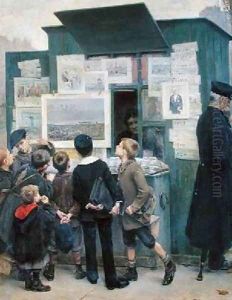Paul-Emmanuel Legrand Paintings
Paul-Emmanuel Legrand was a French actor born in 1827, renowned for his contributions to the world of theater during the 19th century. Although primarily celebrated for his work on stage, details about his early life, including his upbringing and initial foray into the arts, remain relatively obscure, mirroring the limited documentation that characterizes many artists of his era. Legrand's career is often highlighted by his performances in classical and contemporary plays, which showcased his versatility and depth as an actor.
His prominence in the French theater scene was most notable during the mid to late 19th century, a period marked by significant cultural and artistic developments in France. Legrand's performances were acclaimed for their emotional depth, physicality, and his ability to convey complex characters, making him a favored actor among both audiences and critics of the time. Despite the acclaim, there are few surviving records detailing the full breadth of his repertoire or the specific roles that defined his career.
The world of 19th-century French theater was vibrant and evolving, with the likes of Molière, Racine, and later, more contemporary playwrights, shaping the theatrical landscape. Legrand's contributions to this milieu would have involved navigating the transition between classical interpretations and the burgeoning push towards realism and naturalism in theater, reflecting broader shifts in European art and literature. His death in 1911 marked the end of an era for French theater, just as the world was on the cusp of dramatic changes with the onset of the 20th century.
While Paul-Emmanuel Legrand may not be as widely remembered as some of his contemporaries, his work remains a testament to the rich theatrical tradition of France. The lack of extensive records about his life and career leaves much to the imagination and further study. Scholars and enthusiasts of French theater history continue to piece together the legacy of actors like Legrand, recognizing their roles in shaping the dynamics of performance and interpretation that influenced generations of theater practitioners to come.
